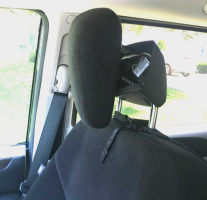
— A Chrysler active headrest lawsuit alleges occupants are suddenly hit in their heads because the head restraints inadvertently deploy without crash impacts.
The Chrysler headrest lawsuit includes all consumers in the U.S., excluding California, who formally owned or leased or currently own or lease any of the following vehicles equipped with active head restraints.
- 2010-2018 Dodge Journey
- 2010-2011 Dodge Nitro
- 2010-2012 Jeep Liberty
- 2010-2017 Jeep Patriot or Compass
- 2010-2012 Dodge Caliber
- 2010-2018 Dodge Caravan
- 2011-2018 Dodge Ram C/V
- 2011-2018 Dodge Durango
- 2011-2018 Jeep Grand Cherokee
- 2010-2014 Chrysler Sebring
- 2010-2014 Dodge Avenger
- 2011-2018 Chrysler Town & Country
- 2011-2018 Chrysler 200
- 2011-2018 Chrysler 300
The Chrysler active head restraint is marketed as a safety device to protect occupants from head and neck injuries in rear-end collisions. The headrest, manufactured by Grammer, is supposed to propel forward towards the head to cushion the head and neck in a rear-end crash.
According to the lawsuit, the forward-facing padded surface is mounted to a plastic carriage that is loaded by pre-tensioned springs when stowed in the headrest, and the carriage is secured in the stowed position by a pin-and-hook latch assembly.
The pin is secured in a nest in the carriage and the latch is linked to the vehicle’s electronic computer control unit.
The control unit detects a rear-end collision and triggers the pin-and-hook latch to release the pin allowing the carriage to be forced forward by the springs. The front of the headrest moves forward by 40 millimeters and upwards by 30 millimeters in .027 seconds.
The class action alleges Chrysler used cheap Acrylonitrile Butadiene Styrene (ABS) plastic for the carriage that is secured by the latch pin against the force of the compressed springs.
The two springs combined allegedly exert 75 pounds of force on the plastic bracket which weakens over time.
"The resistance to the stored potential force of the two compressed springs in the AHR creates continuous pressure which, over time, inevitably leads to what is known as a 'plastic creep' and eventually to cracking and component failure. ABS is prone to tell-tale 'stress-whitening,' where the plastic creep and cracking is occurring, allowing one to see where the plastic’s integrity has been compromised and where the plastic will break." - Headrest lawsuit
One of the plaintiffs says his passenger-side active headrest deployed without warning in 2018. His dealership said the headrest couldn't be reset and would need to be replaced for $700, but the warranty wouldn't cover the cost.
The plaintiff claims the headrest latch and pin remained in place, but the head restraint still deployed due to cheap plastic components.
The plaintiffs say a consumer can determine whether a deployment was uncommanded or commanded because the hooks retract in a commanded deployment. However, an intact hook-and-pin assembly (and the broken plastic) indicates it was an uncommanded deployment.
Chrysler dealerships allegedly tell customers they will need to pay the entire cost of replacing the headrests even when the vehicles are still under warranties. According to the plaintiffs, the automaker refuses to take responsibility and instead blames customers for problems.
Fiat Chrysler (FCA US) has known about the alleged headrest problems since 2010 but refuses to recall the affected vehicles.
The National Highway Traffic Safety Administration (NHTSA) opened an investigation in September 2019 following complaints about active head restraints inadvertently deploying in 2014 Jeep Grand Cherokees and Dodge Durangos. However, the agency hasn't released any conclusions about the probe.
Chrysler says there is no safety defect and no unreasonable risk of injury even in the "rare event" of inadvertent deployment. The automaker says it "strongly objects to any alternate characterization."
The Chrysler headrest lawsuit was filed in the U.S. District Court for the Southern District of Florida: Nuwer, et al., v. FCA US LLC, et al.
The plaintiffs are represented by Kozyak Tropin & Throckmorton, Podhurst Orseck, P.A., Gilligan, Gooding, Batsel & Anderson, and Santiago Burger LLP.




